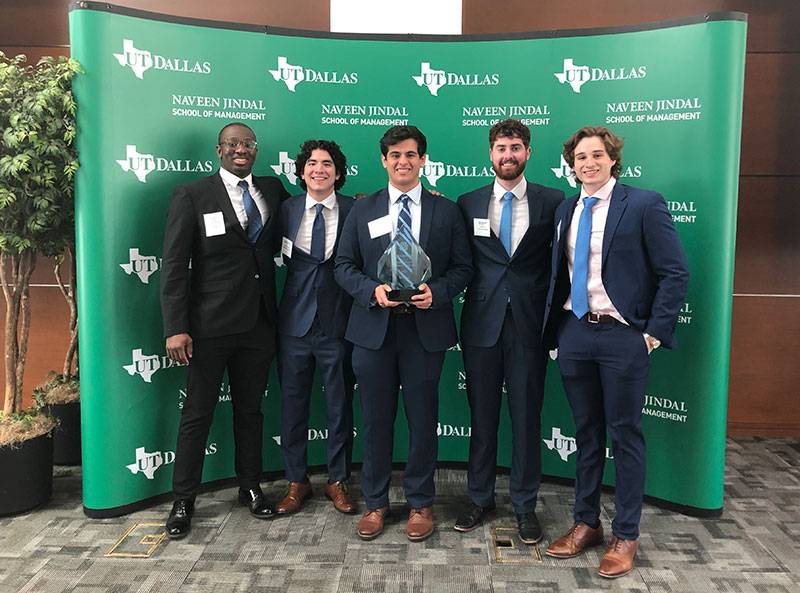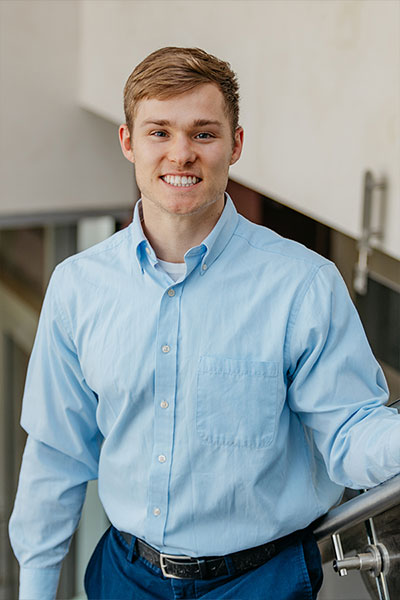
In April, a team of five finance majors at the Jerry S. Rawls College of Business competed in the Chartered Financial Analyst (CFA) Institute Research Challenge . Over the course of several months and stages of the competition, the team of students continued to turn heads, eventually finishing No. 1 in Texas and No. 41 globally.
The team consisted of Favian Arreola, Esteban Bejarano, Kenechukwu Okeke, Joseph Prim, and Ryan Ramos. Bobby Merriman, assistant professor of practice of finance, served as the team’s faculty advisor.
“This is an incredible accomplishment and Texas Tech has never advanced this far in our history,” said Merriman. “Not only were we the only school from Texas to make it to the semifinals, but we were competing against the top 17 schools in all of North and South America.”
The CFA Institute Research Challenge is a global equity research competition that takes place during March, April, and May. In 2024, over 6,000 students from 95 countries participated. Each team researched and analyzed a designated publicly traded company to prepare a written report that supported a buy, sell, or hold recommendation. Teams then created a presentation from that report to present in front of a panel of industry experts. Along the way, teams could receive input and guidance from a faculty advisor and an industry mentor.
The team and Merriman noted that this was the first time in over 10 years that Texas Tech University sent a team to compete in the challenge.
“A lot of the schools we competed against had years of experience with this challenge, so they knew what was leading up to it,” said Prim. “We definitely had an underdog mentality coming into the challenge.”
Like the best underdog stories, the team came together through serendipitous means, overcame unfamiliar circumstances through hard work, and, perhaps most of all, enjoyed playing the role of spoiler to larger, more experienced universities.
The Underdog is Formed
Think about famous underdog movies like The Mighty Ducks or Cool Runnings. Often, the forming of the team can be as important as the team’s performance or success.
It was no different here.
The group credits Arreola with being the driving force that brought them and Merriman together.
“I'm starting my CFA, and I registered last semester,” said Arreola. “I got an email from the CFA about the challenge pretty much saying, ‘Hey, you're a student, and you should do this.’”
Since Arreola had not heard about this competition from any of his instructors, he was a little unsure where to begin in forming a team. He turned to his experience working with students in his finance courses. Arreola had different finance classes with each of the team members, so he felt he had a good grasp on what each could bring to the team.
“I think we brought a broad set of talents together,” said Bejarano. “We had a team that's very analytical and more presentation-focused. When you join a group like that, it can bring a lot of different angles and perspectives to the team, and I think that's what made us so successful.”
With the core team made, Arreola turned to the faculty advisor role and reached out to Merriman. While Merriman was excited for the students to have this opportunity to compete, he was not sure he was the right pick. He thought the team needed a faculty member who had more experience, especially with this challenge.
“I sent Favian to a few other professors because I just thought they'd be a better fit,” said Merriman.
However, Arreola had a difficult time finding a faculty member who had more experience with the CFA challenge, and he was starting to run short on time.
“Eventually, I said forget it,” said Merriman. “We’ll just do it. We'll figure it out as we go.”
With the team and faculty advisor all lined up, it was time to get to work.
Cue the Working Montage
The first round of the challenge consisted of researching a publicly traded company and writing the recommendation report in just a few short months.
“We've taken Dr. Merman's statements before, so we had some experience already making the reports with some of our classes,” said Okeke, “so that helped a ton.”
Even with some familiarity with the type of report they needed to write, the team learned quickly that writing the report for the challenge would be very different from writing it for a class.
“Sometimes translating what you are taught in class to apply to the real world can be challenging,” said Bejarano. “You learn formulas and equations in class while studying for tests. But then you go out in the real world and ask yourself, ‘How does this stuff apply? How does this look in practice?’ Understanding the difference between class and the real world and navigating that transition was something I struggled with.”
The team found they needed to spend a lot of time on this project. They were researching a real company and needed to monitor the company and frequently update their report. The team also knew they needed an intense level of detail in the report.
The team found themselves spending late nights and weekends at Rawls College. And while being some of the handful of students in a quiet building can feel isolating, Merriman made sure they never felt alone.

The team fondly recalled Merriman joining them to work one Sunday, even bringing pizza to help keep morale high.
Merriman never saw this as extra work, really. In his mind, he was not doing anything but matching the effort the team was putting in.
“I just considered myself a part of the team,” said Merriman. “They're up here on a Sunday; I can't be sitting at home in PJ's. Obviously, they put in a lot more hours than I did, but that was my honest feeling. I needed to be there with them and help turn in this report together.”
The team also credits their industry mentor, Director of Investment Operations Christopher Gailey, with helping them navigate the grueling hours of work.
“Chris sees a lot of these kinds of reports every day, so it kind of helped us develop our skills,” said Arreola. “It was great to see what he actually likes in a pitch book and what information is important because we're students. There's only so much we know about the actual practitioner side of things.”
In total, the team believes they worked over 600 hours in a few short months to create the report and presentation. Even then, they feel that may be underestimating their time spent.
“I think passion was a big part of our success,” said Bejarano. “There were definitely some Saturdays or Sundays we very easily could have been somewhere else or doing something other students would consider more fun. But I think we were all here even when we didn't need to be because we wanted to be here, and I think that's a big factor.”
The Underdogs Show Out
The CFA Institute Research Challenge is divided into several stages. The first is the local competition, which is followed by sub-regionals, regionals, and a global final.
The team would eventually go on to compete in the regional semifinals. However, they always felt like underdogs at each leg of the competition.
“It was always cool seeing the pool get smaller and smaller,” said Ramos. “It felt like that fun aspect of a March Madness bracket where we’re like the No. 16 seed or a Cinderella story.”
Because every team had to research and write a recommendation report based on the same company, it did not take long for the team to realize their hundreds of hours started to pay off and create distance between them and schools who have participated in this challenge for years.
“We knew we had the exact same information as everyone else, so it was really about going a step deeper,” said Okeke. “We had to figure out how we could differentiate ourselves from all the other teams in the challenge.”
Ramos recalled the exact moment after their sub-regional presentation when he realized they had a chance at winning and competing in the regional semifinals.
“I knew we meant business when Ken and I went to the bathroom and bumped into the guys from another school,” said Ramos. They were like, ‘Man, y'all's presentation was awesome!’ That's when I thought, ‘Are we going to win this?'”
After the regional semifinals were over, the team continued to make the most of the experience. Gailey helped connect the team with tours at places like BlackRock and Magnitude Capital. During the tours, the team had the opportunity to showcase their work and continued to ask for feedback, even after their run in the competition ended. They refused to be content with their performance but always looked for ways to improve.
“We had one guy at a hedge fund look through our pitch book, and he was blown away and told us we should get a job as a consultant,” said Arreola. “It's cool seeing guys in the industry that are super successful giving us great feedback and making us feel like we could actually do this work. We felt we could be around with everyone else too.”
Competitors. Built on Rawls.
While the team’s run ended in the regional semifinal round, the team gained meaningful takeaways from the entire challenge. Takeaways that are sure to impact their own careers and Rawls College.
“Having people you like working with and being around is a big deal,” said Okeke. “It just makes it a lot better because if I was doing this and I didn't like my team, I wouldn’t have stayed up until 2 a.m. doing this work. It just feels a lot better if you like the people you work with.”
Prim gained more confidence in his abilities as he prepares to enter the finance world.
“Having that opportunity to get ourselves out there and actually talk to industry professionals that are well known is a confidence builder,” said Prim. “Just seeing that things can come out of Texas Tech contrary to what you hear a lot from outside people was great.”
Above all else, the team hopes their fellow finance students see their success as a roadmap.
“We don't want this to be a one-year thing,” said Bejarano. “We really want this to be a step towards a future where students not only participate but can use the resources that we started creating today. Don’t be afraid to reach out to us in the future or to Dr. Merriman and ask for advice on how to be successful. I really do believe that this school has a lot of potential.”
Merriman, for his part, hopes to continue building what this team has started.
“I believe that what this team accomplished and the groundwork they’ve laid are things future teams for the next decade will continue to reap the benefits of,” said Merriman. “I really do believe that any future success of Texas Tech in this competition will, in some way, be linked to the work set forth by this team. They not only showed what is possible at Texas Tech but also gave future teams a stepping stone to help launch them into their own success story.”
